160th Anniversary of the End of the Russo-Caucasian War

The war between the Russian Empire and the native peoples of the Caucasus led to significant population displacements.
SUKHUM / AQW'A ― Today, on 21 May 2024, we commemorate the 160th anniversary of the end of the Russo-Caucasian War. In this video, we delve into the history of Abkhazia and the impact of this war, remembering its victims and the significant events that shaped the region.
The Russo-Caucasian, also known as the Caucasian War, officially ended on 21 May 1864, marking 160 years since this significant event. The Russo-Caucasian War stands as the longest-running military conflict in Russian history.
The main players in the War were the Avars, Chechens, Circassians, Ubykhs, and Abkhazians, listed from east to west.
Throughout the 19th century, the War significantly altered the geopolitical landscape of the region. The war between the Russian Empire and the native peoples of the Caucasus led to significant population displacements, including those of the Abkhazians.
![Reading Mercury [London, England] - 07 December 1839. Reading Mercury [London, England] - 07 December 1839.](https://substackcdn.com/image/fetch/f_auto,q_auto:good,fl_progressive:steep/https%3A%2F%2Fsubstack-post-media.s3.amazonaws.com%2Fpublic%2Fimages%2F786a39de-cd29-4fb6-8a23-e441aafe10fe_1179x842.jpeg)
Reading Mercury [London, England] - 07 December 1839.
Polish revolutionaries actively participated in the liberation struggle in the West Caucasus, aiming to simultaneously incite an Abkhazian-Circassian and Polish revolt against the Russian Empire. Teofil Lapinski, a Polish military commander, writer, and anti-Russian imperialist activist, visited Circassia and Abkhazia during the war. In late 1862, he led an Abkhaz-Circassian delegation to London, where they were received by the Prime Minister of England, Lord Palmerston. During this visit, Lapinski delivered a short speech in Lord Palmerston's presence:
"At the present moment, the Abkhazians are the sole tribe who are continuing to mount powerful resistance to Russia in the Caucasus. But even they have become exhausted under the weight of the unequal battle and can be expected to hold out in such conditions for at most another three years. Then they will inevitably follow in the tracks of the other Caucasian tribes: they will move to Turkey. Europe ought, with a view to weakening the northern colossus and keeping its army somehow occupied in the south, when a serious blow is also struck from the opposing side, to support the valiant Abkhazians, forestall their banishment from their native soil and thus save perhaps all the mountain-peoples of the area. To whom if not England, the principal naval power in the world, should this noble and strategic initiative belong in this case?."
Teophil Lapinski recounted this meeting with Lord Palmerston in his memoirs, which were published in Polish in the Gazeta Narodowa in 1878.
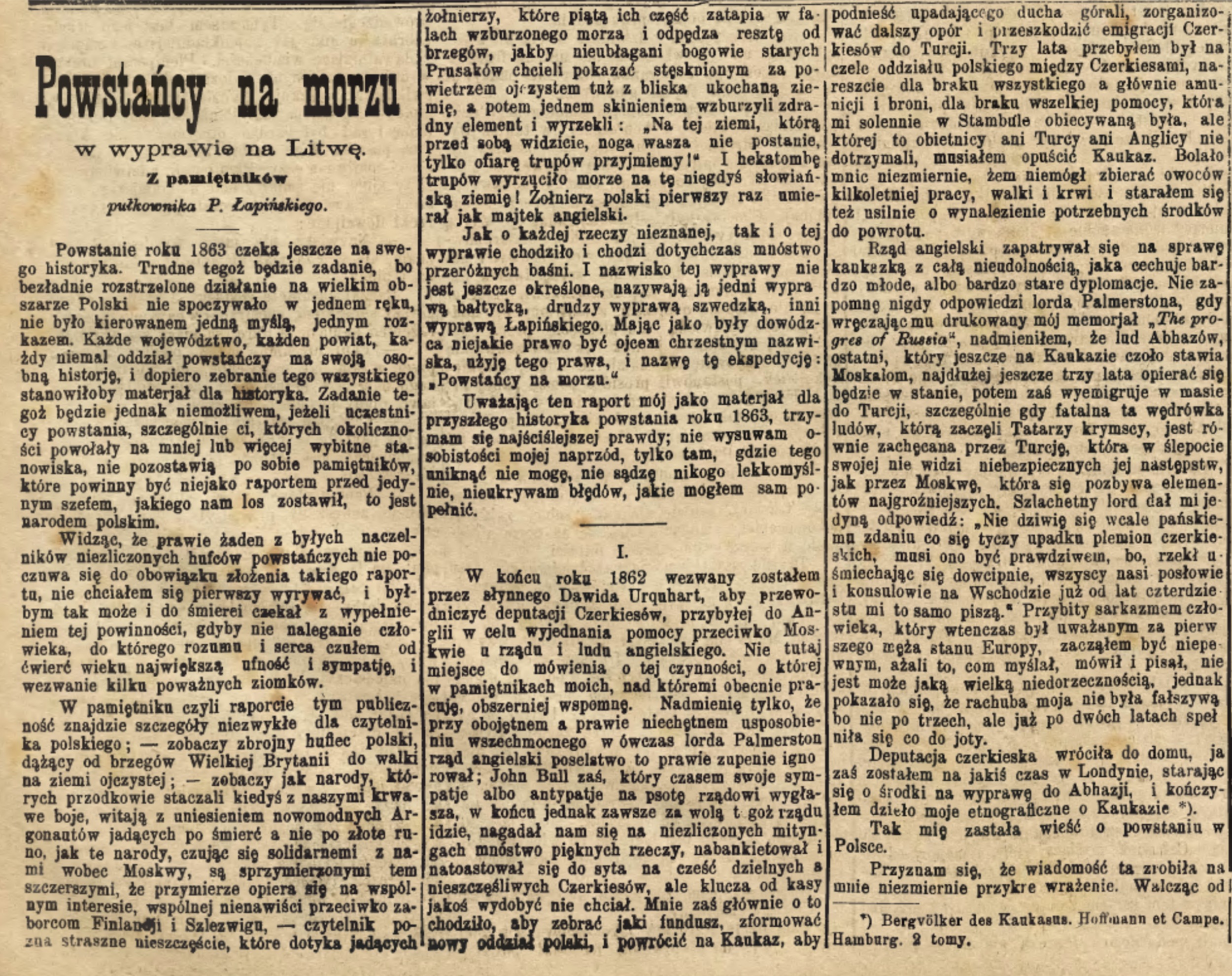
Insurgents on the Sea in a journey to Lithuania. From the diaries of colonel P. Łapiński. Gazeta Narodowa, № 180 (1878).
The cantons of Akhchipsy, Aibga, and Pskhu in northwest Abkhazia resisted Russian advances until 1864. This year marked the official end of Russo-Caucasian War and saw approximately 25,000 Abkhazians, primarily from the Sadz, Akhchipsy, Aibga, and Pskhu regions, forced to leave their homeland, leaving territories from Sochi to the Bzyp River almost completely deserted.
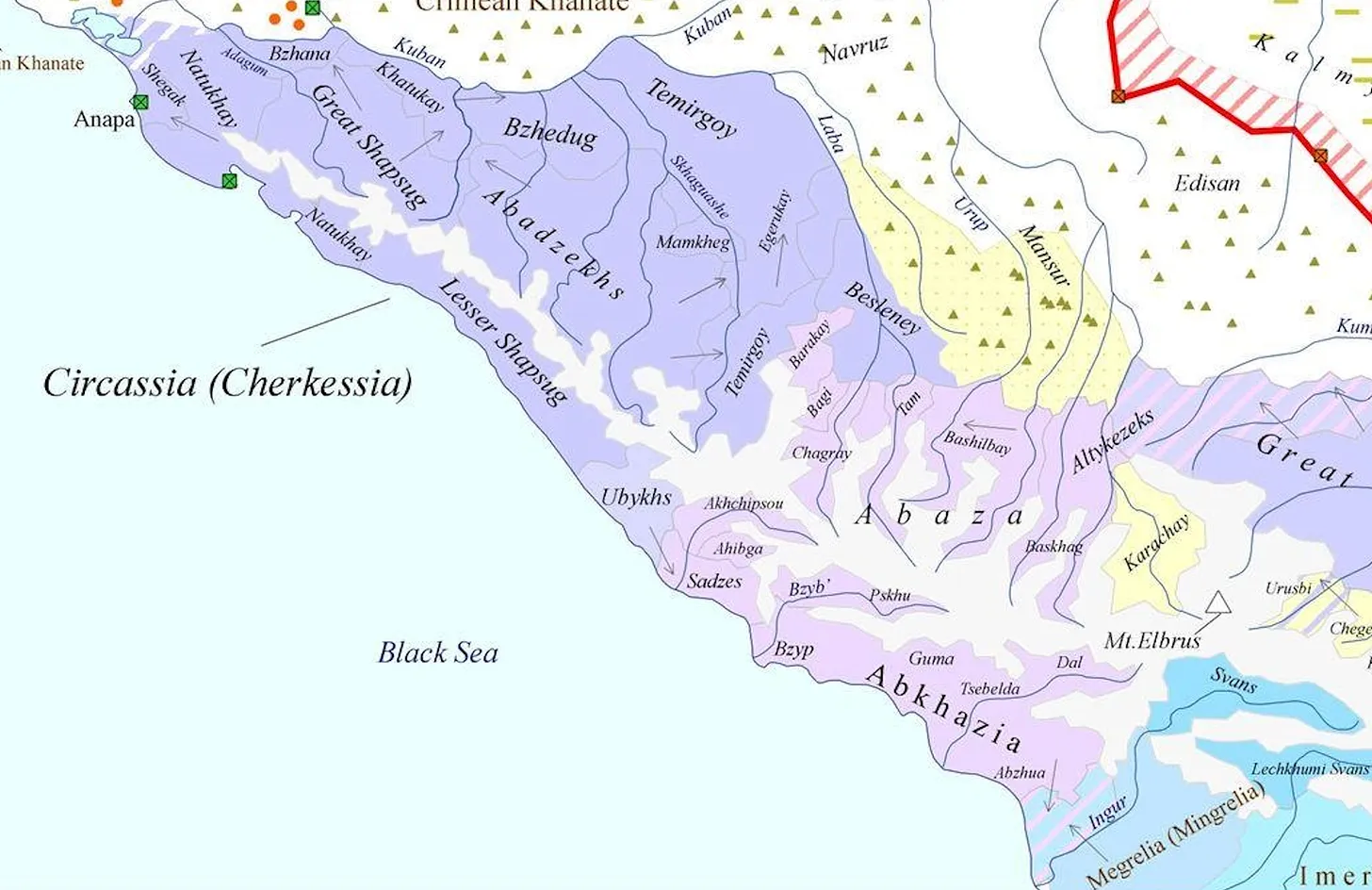
Immediately after the Russo-Caucasian War ended on 21 May 1864, the independent princedom of Abkhazia was abolished in June 1864. This led to the renaming of Abkhazia as the "Sukhum Department" under a "military-national government," the introduction of direct imperial administration, and the death of the last ruler of Abkhazia.
These actions led to significant discontent among the people, resulting in the Abkhazian Uprising of 1866 and, once again, the mass forced exile of Abkhazians to Turkey in 1867. Major uprisings in Abkhazia had previously occurred in 1821-27, 1840-45, 1861, 1866, and 1877, each leading to significant exiles of Abkhazians to the Ottoman Empire. The situation culminated in the Russo-Turkish War of 1877–1878. In total, approximately 135,000 Abkhazian, constituting most of the Abkhazian population, were deported.
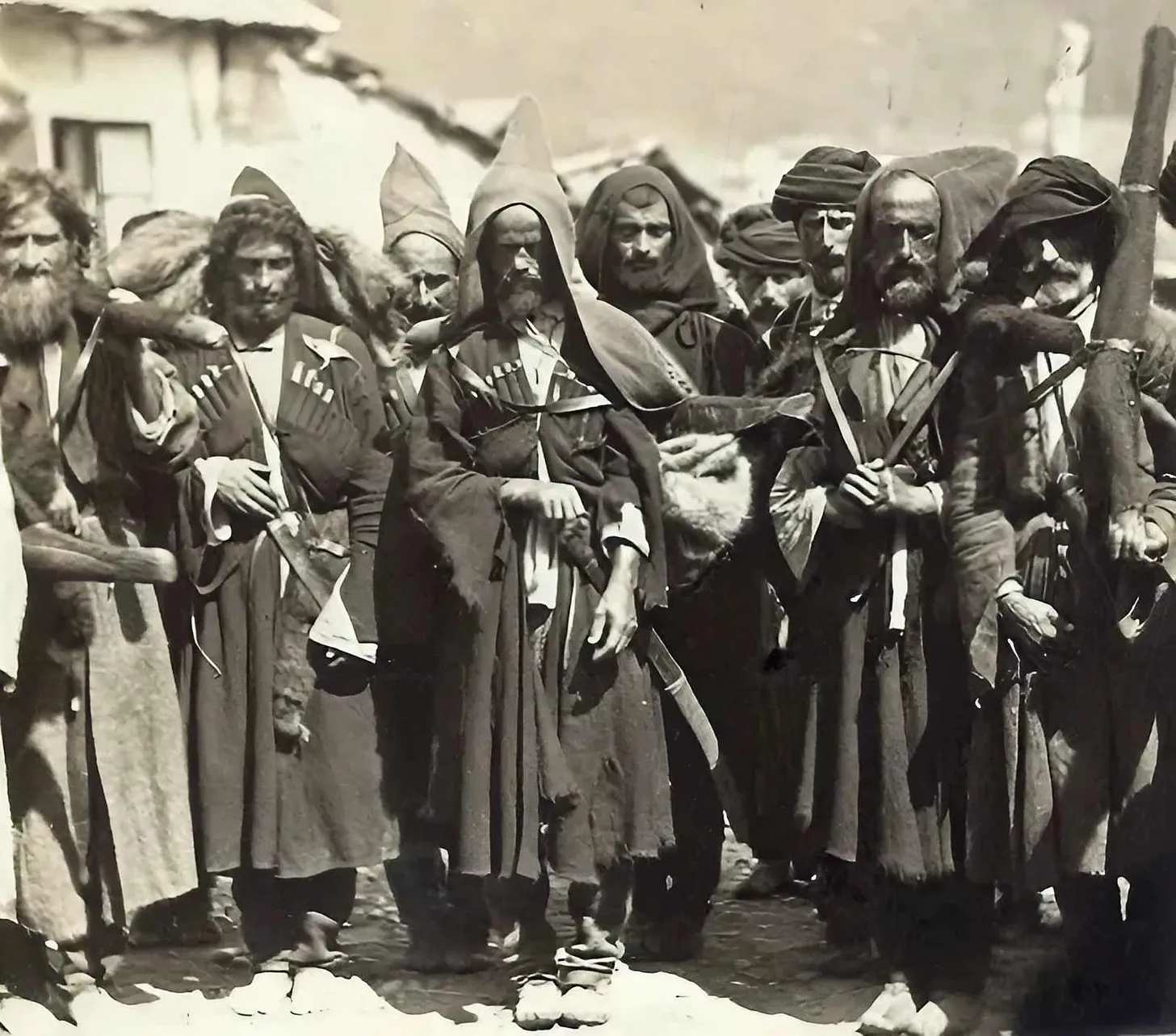
Abkhazians who took part in the 1866 Likhni uprising. Photo by D. I. Yermakov (1867).
The Abkhazians faced significant challenges during the 19th century Caucasian War, enduring ongoing resistance, numerous uprisings, and the forced migration of a substantial portion of their population. This led to the depopulation of their lands, particularly in central Abkhazia, the heart of their territory.
"What is to be the future of this Earthly Paradise? Its ancient and primaeval inhabitants are gone. They have been exiled for a quarter of a century; their dwellings and their tombs are alike lost in the glorious vegetation that feeds nothing but bears and mosquitoes and fevers. A people that had lived the same life in the same place since the beginning of history has been dispersed or destroyed. The Abkhasians have vanished, leaving behind them no records, and hardly sufficient material for the ethnologist who desires to ascertain to what branch of the world’s ‘families’ they belonged."
― 'The solitude of Abkhazia', by Douglas W. Freshfield (1896)
By the end of the nineteenth century, pamphlets began appearing among the Georgian intelligentsia, such as Jakob Gogebashvili’s "Who Should Be Settled in Abkhazia?" Later, many Georgians settled in Abkhazia, feeding resentments that culminated in the recent Georgian-Abkhazian war—a conflict that can only be understood against the background of this trauma from the preceding century. As a result, the demographic situation in Abkhazia changed dramatically, with the Abkhazians, the indigenous people of this territory, becoming a minority in their own homeland.
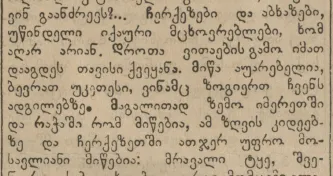
Newspaper “Droeba”, Tiflis, 1873. № 399, p.3 The article: shik'rik'i (Courier).
Translation: "The Circassians and Abkhazians, the former inhabitants there, are, as you know, no longer [there]. They abandoned their country as a result of the state of the times. The land is immeasurable and far better than some of our places. Take for example the soils in Upper Immereti(a) and Rach’a, the soils on the fringes of this sea [sc. the Black Sea] and in Circassia are 10-times more productive in terms of yield:…"
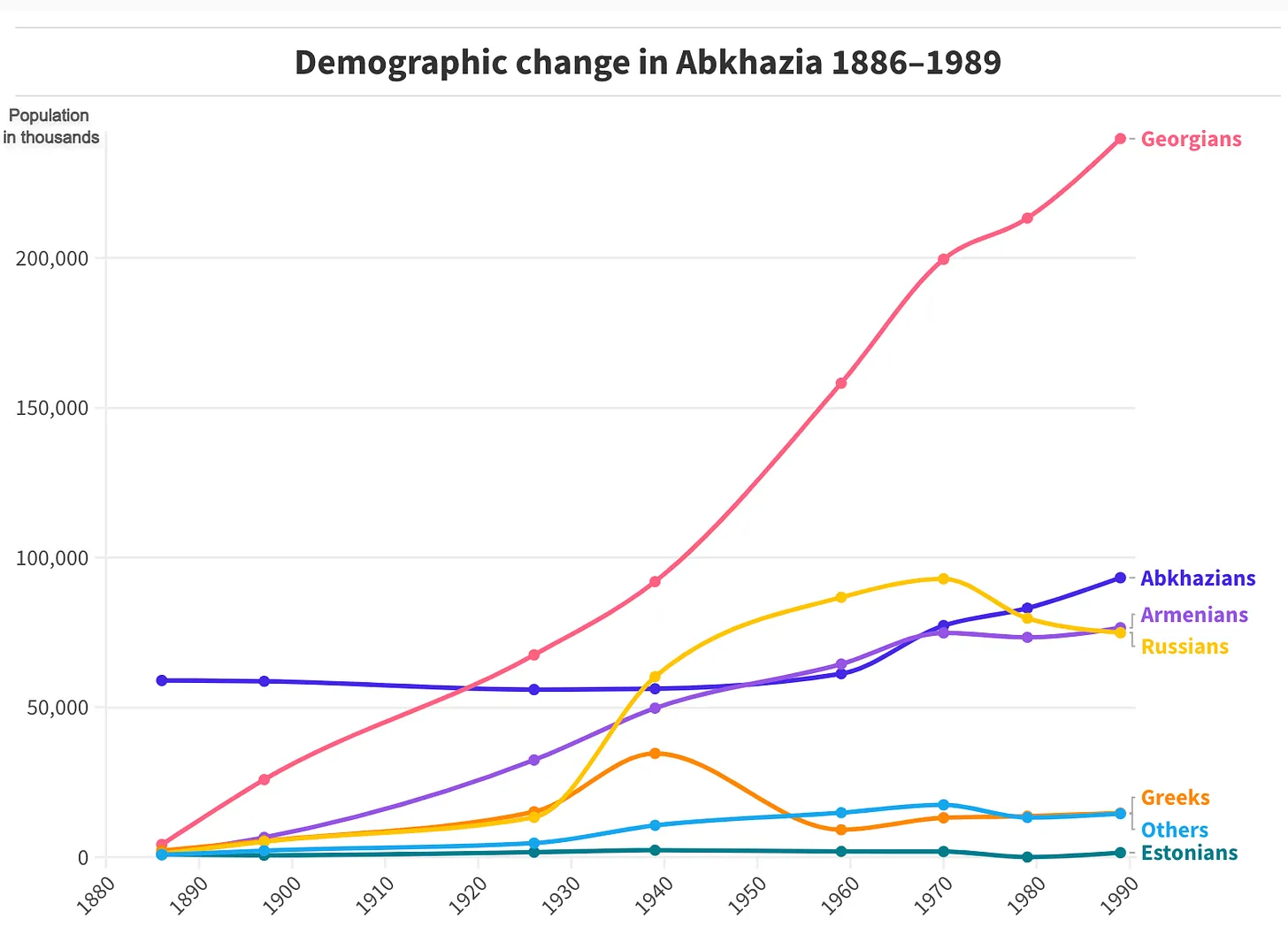
Sources: Russian, Soviet and Georgian population censuses and ‘Conciliation Resources’ (UK).
Understanding this tragic history is crucial to comprehending the current dynamics and ongoing resilience of the Abkhazian people. Their story is a testament to their enduring spirit and the importance of remembering and honouring their past.
At a gathering in Sukhum, capital of Abkhazia, on 31 May 1990, 30,000 representatives of the Caucasian mountain peoples unanimously passed a resolution. This resolution acknowledged 21 May 1864, the day marking the end of the Russian-Caucasus War, as a day of remembrance for the war's victims and those who endured forced deportation.
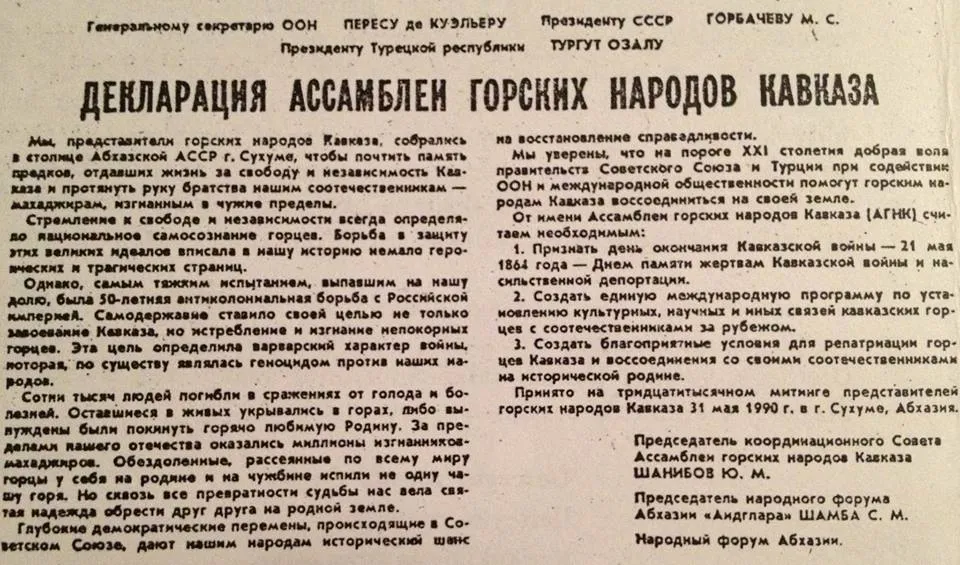
Declaration of the Assembly of the Mountain Peoples of the Caucasus (31 May 1990).
And on 15 October 1997, the Abkhazian Parliament passed a resolution recognising the 19th-century deportation of the Abkhazian people to Ottoman lands as an egregious human rights violation and genocide. The resolution also called for the unconditional acceptance of the descendants of the exiled Abkhaz-Abazinian people who wish to return to their homeland.